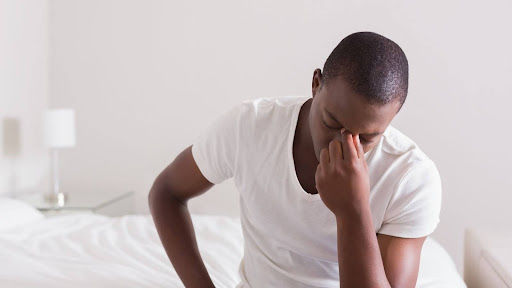Alcohol Withdrawal and Sleep: Understanding the Link and Managing Insomnia
- May 15
- 5 min read

If you're going through alcohol withdrawal and can’t seem to get any real sleep, don’t worry — you’re not doing anything wrong.
In fact, nearly 1 in 2 people going through withdrawal deal with insomnia. It’s one of the most common — and most frustrating — parts of recovery.
It’s tough enough to quit drinking, and when you add nights of tossing and turning, it can feel overwhelming.
But here’s the good news: you can get through this.
Through this article Let’s talk about why sleep gets so disrupted during alcohol withdrawal, how long it might last, and what you can do to rest, recover, and feel like yourself again.
Why Alcohol Withdrawal and Sleep Struggles Go Hand-in-Hand
You might’ve noticed that when you were drinking, you could pass out fast—but the sleep never felt truly restful and even ended up with insomnia.
Alcohol interferes with the brain’s natural sleep systems in several ways:
it disrupts your brain chemistry
throws off your body
clock reduces the quality of your sleep, and
increases anxiety levels
All of which make it harder to get meaningful rest. So yes alcohol withdrawal definitely can affect your sleep.
Once you stop drinking, your body starts to adjust, but your brain can feel like it’s stuck in overdrive. Falling asleep is hard, staying asleep can be even harder, and you may wake up feeling drained, even after a full night in bed.
How Long Does Insomnia Last During Alcohol Withdrawal?
For some people, the worst of the insomnia only lasts a few days during early detox. For others, it can linger for weeks—or even a couple of months.
Here’s a rough idea of what you might expect:
Days 1–3: Difficulty falling or staying asleep, night sweats, heightened anxiety
Week 1–2: Ongoing restlessness, racing thoughts, disrupted sleep cycles
Weeks 3–6: Sleep begins to improve for many, though not everyone
Months 1–3: Brain chemistry continues to rebalance; quality sleep improves with time and routine
Everyone’s timeline is different. Things like how long and how much you drank, mental health, and stress all play a role.
The Psychological Impact of Poor Sleep During Withdrawal

Lack of sleep doesn’t just make you tired — it can really affect your emotional health.
When you're not sleeping, you're more likely to feel anxious, depressed, irritable, and emotionally drained. It can also trigger cravings, and in some cases, even increase the risk of relapse.
That’s why managing sleep isn’t just about comfort — it’s about protecting your recovery and emotional stability. The better your rest, the stronger your foundation.
4 Proven Ways to Improve Sleep During Alcohol Withdrawal
Establish a Consistent, Healthy Sleep Routine
One of the most powerful ways to support better sleep during alcohol withdrawal is by setting a consistent sleep schedule. Try to go to bed and wake up at the same time every day—even on weekends.
About 30 to 60 minutes before bedtime, begin winding down with calming activities like reading, journaling, gentle stretching, or listening to soothing music.
It's also important to avoid screens late at night, as the blue light from phones and TVs can interfere with your body’s natural melatonin production, making it harder to fall asleep
Create a Calming Environment
Your bedroom should feel like a sanctuary for rest. Keep the room cool, quiet, and as dark as possible to promote better sleep.
Small changes—like adding blackout curtains or using a white noise machine—can make a big difference.
Reserve your bed for sleeping only, not for working, watching TV, or scrolling through your phone, so your brain begins to associate it with rest and relaxation.
Relaxation Techniques that Work
Simple relaxation practices can go a long way in easing your body and mind into sleep.
Try deep breathing exercises, such as the 4-7-8 method: inhale for four seconds, hold for seven, and exhale slowly for eight.
You might also find comfort in guided meditations or sleep-focused apps like Calm or Insight Timer.
Light yoga or stretching can help release tension, and aromatherapy with lavender or chamomile may create a calming atmosphere to help you drift off naturally.
What to Avoid (Even If It Feels Helpful)
A few everyday habits could be standing between you and a good night's sleep. Try to avoid caffeine after 2 p.m, as it can linger in your system longer than you think.

It's also wise to skip nicotine or sugary snacks close to bedtime, as both can disrupt your ability to fall and stay asleep.
And while it may be tempting to replace alcohol with another substance to help you sleep, doing so can backfire—most alternatives interfere with natural sleep cycles and can complicate your recovery over time.
Small changes add up. Give yourself time and patience.
Natural Remedies and Professional Treatment Options for Sleep Issues
If you’re doing everything “right” and still not sleeping, you’re not failing. Sometimes your system needs a little extra support.
Some people find success with:
Light exercise (like walking or stretching) in the late afternoon
Warm baths or herbal teas (like valerian or chamomile)
Cognitive Behavioral Therapy for Insomnia (CBT-I), which helps retrain sleep habits
Short-term sleep medications—but only with medical guidance
Tips: Talk to your doctor or recovery provider to help you find a plan that’s safe and tailored to your needs. Remember, what works for someone else might not be the right fit for you.
When to Seek Help for Insomnia in Alcohol Recovery
If you’ve been sober for a few weeks and your sleep still feels like a nightmare, it might be time to check in with a professional.
Here are a few signs it’s time to reach out:
You haven’t slept more than 2–3 hours a night for over a week
You’re feeling severely anxious, depressed, or hopeless
You’re starting to crave alcohol just to get some sleep
You’ve tried lifestyle changes, but nothing is helping
There’s no shame in needing support. You’re doing the brave work of recovery—sometimes, that means asking for backup.
Final Thoughts: Healing Your Body and Mind Starts With Sleep
Sleep during alcohol withdrawal is rough. You’re tired. You’re trying your best. And still, the nights feel long.
But you’re doing something extraordinary— you’re healing.
Even when it doesn’t feel like it, every night you stay sober, your body and brain are moving closer to balance.
The road isn’t always smooth, but it’s real. It’s worth it. And you don’t have to walk it alone.
If you’re struggling and need support—whether it’s a treatment plan, counseling, or just someone to talk to—there’s help. Real help. And you deserve every bit of it.







